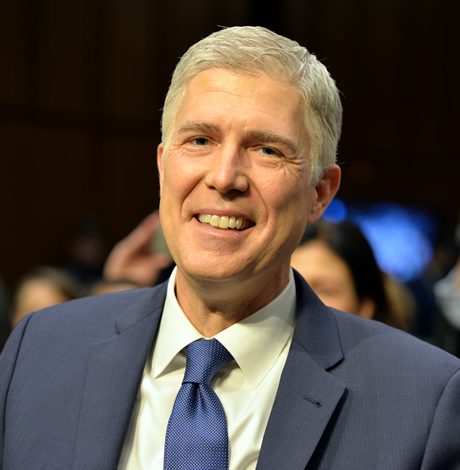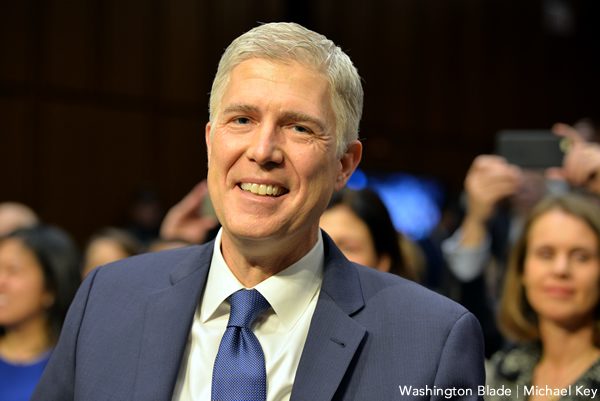News
Gorsuch calls same-sex marriage ‘settled law’
‘I’ve tried to treat each case and each person as a person’

Amid opposition from LGBT rights supporters to the confirmation of Neil Gorsuch to the U.S. Supreme Court, President Trump’s nominee referred to same-sex marriage as “settled law,” but was otherwise relatively tight-lipped about his views during his confirmation hearings.
Grilled by members of the Senate Judiciary Committee about his judicial philosophy, U.S. Circuit Judge Gorsuch on Tuesday maintained “equal justice under the law” — words enshrined at the top of the Supreme Court building — was a “radical” idea, but one he’d uphold, when asked about application of the law to LGBT people.
Pressed by Sen. Al Franken about marriage equality specifically, Gorsuch replied, “It is absolutely settled law,” but added, “there’s ongoing litigation about its impact and its application right now.”
When Sen. Richard Durbin (D-Ill.) asked the nominee about his views on LGBT people, Gorsuch seemed irritated and responded, “What about them?” and as Durbin sought to clarify, the nominee retorted, “They’re people.”
Asked by Durbin to point to a statement or decision favorable to LGBT people, Gorsuch offered his judicial philosophy that all individuals are entitled to equal treatment under the law.
“I’ve tried to treat each case and each person as a person, not a this kind of person, not a that kind of person — a person,” Gorsuch said. “Equal justice under law is a radical promise in the history of mankind.”
Durbin pressed Gorsuch to clarify whether that applies to sexual orientation, prompting Gorsuch to invoke the 2015 Obergefell v. Hodges decision in favor of same-sex marriage.
“The Supreme Court of the United States has held that single-sex marriage is protected by the Constitution,” Gorsuch said, using “single-sex marriage” terminology commonly cited in Europe, but rarely in the United States, to refer to marriage equality.
Durbin brought up LGBT people in the context of questioning of John Finnis, whom Gorsuch identified as a mentor during his time at Oxford University. A conservative one-time law professor, Finnis delivered a deposition in the early ’90s in favor of Colorado’s anti-gay Amendment 2, a law that prohibited cities from enacting non-discrimination ordinances based on sexual orientation. The Supreme Court struck down the law in the 1996 Romer v. Evans decision.
Referencing a passage in which Finnis compared same-sex relationships to bestiality and said antipathy toward LGBT people is based not just on religious reasons, but societal views, Durbin asked Gorsuch whether he was aware of his mentor’s statements.
“I know he testified in the Romer case,” Gorsuch said. “I can’t specifically recall the specifics of his testimony or that he gave a deposition.”
When Durbin sought more information from Gorsuch on the impact Finnis had on his views, Gorsuch referred to rulings he made on the bench as a member of the U.S. 11th Circuit Court of Appeals.
“I think the best evidence is what I’ve written,” Gorsuch said. “I’ve written or joined over 6 million words as a federal appellate judge. I’ve written a couple of books. I’ve been a lawyer and a judge for 25 or 30 years, and I guess I’d ask you, respectfully, to look at my credentials and my record.”
In another exchange with Franken, Gorsuch conceded the issue of same-sex marriage is “settled” law, but acknowledged subsequent litigation is ongoing on its impact and kept his cards close to his vest on his personal views.
Referencing Gorsuch’s help with former President George W. Bush’s 2004 re-election campaign in Ohio as a member of “Lawyers for Bush,” Franken noted that was the year the state had an anti-gay amendment on the ballot and asked the nominee whether same-sex marriage should be subjected to popular vote.
“Senator, I don’t recall any involvement in that issue during that campaign,” Gorsuch said. “I remember going to Ohio.”
When Franken asked the nominee if he was aware of the marriage issue in 2004, Gorusch replied, “Certainly, I was aware about it.”
Pressed further by Franken for his views, Gorsuch added, “Any revelation about my personal views about this matter would indicate to people how I might rule as a judge. Mistakenly, but it might, and I have to be concerned about that.”
When Franken pointed out the U.S. Supreme Court has ruled in favor of same-sex marriage nationwide and asked Gorsuch how his views have changed since 2004, the nominee remain tight-lipped.
“My personal views, if were to begin speaking about my personal views on this subject, which every American has views on, would send a misleading signal to the American people,” Gorsuch said.
The Minnesota Democrat sought to move on to another topic as Gorsuch said he wanted to finish his thought about not being able to disclose personal view, but Franken said, “You’ve given a version of this answer before. I understand.”
The issue of marriage equality came up later in the hearing when Sen. Mazie Hirono (D-Hawaii) brought it up when asking Gorsuch about his views on whether the Constitution protects intimate and personal choices. Gorsuch again declined to express his personal views, but underscored the importance of the Obergefell decision as precedent.
“Obergefell is a precedent of the United States Supreme Court,” Gorsuch said. “It entitles persons to engage in single-sex marriage. That’s a right that the Supreme Court has recognized. It is a precedent of the United States Supreme Court entitled to all the deference to precedence of the United States Supreme Court, and that’s quite a lot.”
Much of the concern over Gorsuch concerns his subscription to the judicial philosophy of originalism in which jurists seek to determine lawmakers’ original intent of enacting statutes before ruling on them, a practice criticized as a means to deny justice to minority groups, including LGBT people. The late U.S. Associate Justice Antonin Scalia advocated that judicial viewpoint in his dissents to major gay rights cases, such as the U.S. Supreme Court decision in favor of same-sex marriage.
Sen. Amy Klobuchar (D-Minn.) sought clarification from Gorsuch on originalism, referencing, among other rulings, the 1996 Virginia Military Institute decision, which determined the state’s exclusion of women from the school violated the right to equal protection under the 14th Amendment. Scalia, in his dissent, wrote the decision was creating a new Constitution, not keeping to the original meaning of the U.S. Constitution.
Asked by Klobuchar whether the ruling was based on the original meaning of the Constitution, Gorsuch kept his views to himself and said, “The majority in that case argued that it was.” Gorsuch repeated his view the concept of equal protection under the law “is quite significant.”
When the Minnesota Democrat asked Gorsuch whether he’d apply that approach to minority groups, such as women, LGBT people and racial minorities, Gorsuch replied, “A good judge applies the law without respect to persons. That’s part of my judicial oath.”
Seemingly unsatisfied with the response, Klobuchar pressed Gorsuch further, prompting him to reply, “I don’t take account of the person before me. Everyone is equal under the eyes of the law.”
The reluctance of Gorsuch to offer his views during the confirmation process is typical of nominees seeking confirmation to the Supreme Court. As other nominees have done in the past, Gorsuch said disclosure of personal views or the appropriateness of a particular decision would suggest a bias on those issues if they came to him after winning confirmation.
Other decisions on which Gorsuch had no comment included the Roe v. Wade decision, the Heller decision affirming the Second Amendment right to own a firearm in D.C. and the Citizens United case allowing unlimited contributions from corporations and unions to political campaigns.
On rare occasions during the hearing, Gorsuch was more direct. Referencing Trump’s pledge to appoint only justices who’d overturn a woman’s right to have an abortion, Sen. Lindsay Graham (R-S.C.) asked Gorsuch if he made any private commitments to Trump to overturn Roe v. Wade, but the nominee replied he didn’t and was not asked to do so.
“I would have walked out the door,” Gorsuch said. “That’s not what judges do.”
A group of 21 LGBT organizations led by Lamdba Legal signed a joint letter to the Senate Judiciary Committee last week declaring their opposition to the nominee and urging rigorous questioning during the confirmation process.
Although Gorsuch has never ruled on the issue of same-sex marriage, the nominee wrote a scathing piece in 2005 for the National Review titled “Liberals & Lawsuits” excoriating the progressive movement for seeking advancements in the courts. Two years after the Massachusetts Supreme Court ruled in favor of same-sex marriage, the article identifies marriage equality as an issue that should be settled outside the judicial system.
When asked by Sen. Orrin Hatch (R-Utah) to respond to criticism over the op-ed, the nominee said he believes the courts, in fact, are a “very important place for the vindication of civil rights,” but in many cases they aren’t appropriate for change.
“I can report to you, having lived longer, as I did report to you in 2005 that the problem lies on both sides of the aisle, that I see lots of people who resort to the court more quickly than perhaps they should,” Gorsuch said.
Much of the discontent over Gorsuch is also related to his 11th Circuit decision in the Hobby Lobby case, when he ruled the Religious Freedom Restoration Act affords “religious freedom” protections to not just people, but corporations, and the business chain could refuse health insurance to female employees that covered contraception. Gorsuch joined a similar decision against the Obamacare contraception mandate in the Little Sisters of the Poor case.
At a time when many businesses and individuals are asserting civil rights laws prohibiting anti-LGBT discrimination unfairly penalize their religious beliefs, some LGBT rights supporters fear Gorsuch could apply that “religious freedom” reasoning in those cases to institute carve-outs for anti-LGBT discrimination.
Under questioning from Durbin, Gorsuch walked through his reasoning in the Hobby Lobby case, maintaining his ruling is based on the belief the U.S. government could make other accommodations for employees seeking contraception other than employer-based health coverage.
“Does the government have a compelling interest in the ACA in providing contraceptive care? The Supreme Court of the United States said, ‘We assume yes. We take that as given,” Gorsuch said. “The question becomes is it narrow tailored to require the Green family to provide it. The answer there the Supreme Court reached in precedent binding on us now, and we reached in anticipation, is no, that wasn’t as strictly tailored as it could be because the government had provided different accommodations to churches and to other religious entities.”
Other LGBT criticism over Gorsuch relates to his decisions on transgender rights. In 2015, Gorsuch joined an 11th Circuit decision against a transgender inmate who alleged she was denied transition-related hormone therapy and unfairly housed in an all-male facility. In 2009, Gorsuch also joined an unpublished opinion finding the provision against sex discrimination under Title VII of the Civil Rights Act of 1964 doesn’t apply to transgender people.
Jim Obergefell, the lead plaintiff in the case that brought same-sex marriage nationwide, wrote in an op-ed for Time magazine on the second day of the Gorsuch hearings he opposes the nominee on the basis that he could undermine LGBT rights, including same-sex marriage, at the Supreme Court.
Noting the narrow 5-4 marriage decision was written by U.S. Associate Justice Anthony Kennedy, who was only confirmed to the Supreme Court after the Senate rejected President Reagan’s nomination of anti-LGBT judge Robert Bork, Obergefell wrote, “we must be as cautious as we were in 1987.”
“As during the Bork hearings, we must again demand that the next justice appointed to the Supreme Court of the United States continue to uphold our Constitution — including equal protections for LGBTQ people under the law,” Obergell wrote. “Donald Trump, in nominating Neil Gorsuch, noted his desire to pick a justice in the mold of Antonin Scalia. That should send chills down the spine of everyone who cares about equality and civil rights.”
Eric Lesh, fair courts director for Lambda Legal, said Gorsuch’s hearing did nothing to allay concerns about the his potential confirmation to the Supreme Court because he “refused to answer very fundamental questions.”
“He kept dodging and weaving and running away from his record, which is clearly hostile to the rights of LGBT people and people living with HIV,” Lesh said. “So, we need answers, and that doesn’t change Lambda Legal’s conclusion that based on a comprehensive review of his record, his views on civil rights issues, on LGBT equality are fundamentally at odds with the notion that our community is entitled to equal dignity, justice, liberty under the law.”
United Nations
UN Human Rights Council extends LGBTQ rights expert’s mandate
29 countries voted for resolution

The U.N. Human Rights Council on Monday extended the mandate of the United Nations’ independent LGBTQ rights expert for another three years.
The resolution passed with 29 countries (Albania, Belgium, Bolivia, Brazil, Bulgaria, Chile, Colombia, Costa Rica, Cuba, Cyprus, the Czech Republic, the Dominican Republic, France, Georgia, Germany, Iceland, Japan, Kenya, the Marshall Islands, Mexico, the Netherlands, North Macedonia, South Korea, Romania, South Africa, Spain, Switzerland, Thailand, and Vietnam) voting for it and 15 countries (Algeria, Bangladesh, Burundi, China, Cote d’Ivoire, Democratic Republic of Congo, Ethiopia, Gambia, Indonesia, Kuwait, Malawi, Maldives, Morocco, Qatar, and Sudan) voted against it.
Benin, Ghana, and Kyrgyzstan abstained.
The U.S. in February withdrew from the Human Rights Council. The Trump-Pence administration in 2018 pulled the U.S. from it. The U.S. in 2021 regained a seat on the Human Rights Council.
Graeme Reid has been the UN’s independent LGBTQ rights expert since 2023. The South African activist, among other things, previously ran Human Rights Watch’s LGBT Rights Program.
Maryland
Maryland’s oldest rural gay bar — and one of the last — is a log cabin in the woods
The Lodge is a Boonsboro watering hole resembling a log cabin

By SAPNA BANSIL | In the woods of a conservative Western Maryland town of fewer than 4,000 people is an unlikely landmark of state LGBTQ history.
The Lodge, a Boonsboro watering hole that resembles a log cabin, is Maryland’s oldest rural gay bar — one of a few remaining in the country, according to historians.
For about four decades, the Washington County venue has offered safety, escape and community to queer people far from large, liberal cities. Starting Friday night, The Lodge will close out Pride month with one of its biggest parties of the year: a weekend of dancing, drinking and drag in celebration of Frederick Pride, held about 20 miles away in the area’s largest city.
The rest of this article the Baltimore Banner published on June 27 can be read on its website.

South Africa National Assembly Speaker Thoko Didiza on June 17 swore in lesbian feminist Palomino Jama as a new MP.
Jama joins other LGBTQ legislators — including Public Works and Infrastructure Minister Dean Macpherson; Forestry, Fisheries and the Environment Minister Dion George; and Deputy Women, Youth, and Persons with Disabilities Minister, Steve Letsike.
Jama said she will work hard and excel as MP.
“What a great moment to be alive. Thank you youth of 1976, thank you Simon Nkoli, Phumi Mthetwa, Paddy Nhlaphos, Vanessa Ludwig, and others for what you did for the LGBTI people in the 80s and 90s. Lastly, for the fierce fist of the Jamas to always hit where it matters for the people of this country,” said Letsike.
Embrace Diversity Movement, a local LGBTQ organization, said Jama’s inauguration came at an appropriate time, during Pride month.
“Her swearing-in took place during a month of profound significance in June, which marks both international Pride Month and Youth Month in South Africa,” said the group. “Palomino is a seasoned queer activist and dedicated community builder with a distinguished record of leadership and service.”
“The EDM proudly supports Palomino in her deployment to parliament, her presence meaningfully advances youth and queer representation in public office,” added the Embrace Diversity Movement. “We are confident that she will serve the people of South Africa with integrity, courage, and distinction.”
South Africa is the only African country that constitutionally upholds LGBTQ rights. There are, however, still myriad challenges the LGBTQ community faces on a daily basis that range from physical attacks to online abuse.
Letsike in May faced a barrage of online attacks after she released a scathing statement against popular podcaster Macgyver “MacG” Mukwevho, who during a podcast episode in April insinuated that the reason behind popular socialite Minnie Dlamini’s “unsuccessful” relationships were probably due to the bad odor from her genitals.
Letsike, who viewed MacG’s comments as offensive, called for the podcaster to be summoned before parliament’s Portfolio Committee on Women, Youth, and Persons with Disabilities and criticized the local television station that aired the podcast.
X users and other social media subscribers bombarded Letsike with anti-lesbian comments. She, however, was unphased.
Letsike continues to face anti-lesbian comments, even though MacG apologized and the television station on which his podcast had aired cancelled its contract with him.



















